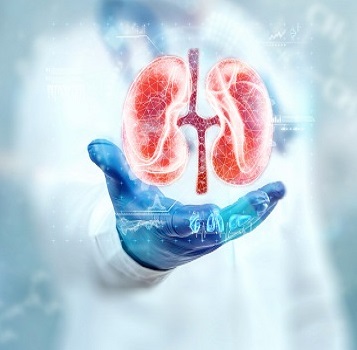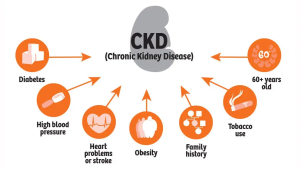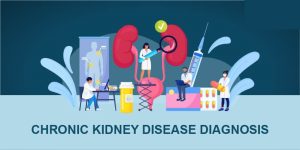Chronic Kidney Disease; Symptoms, causes and diagnosis
Chronic kidney disease (CKD)—or chronic renal failure (CRF), is a long-term condition where the kidneys don’t work as well as they should and gradually lost it finicality. CKD is more prevalent in the elderly population. However, while younger patients with CKD typically experience progressive loss of kidney function, 30% of patients over 65 years of age with CKD have stable disease.
CKD can range from a mild condition with no or few symptoms, to a very serious condition where the kidneys stop working, sometimes called kidney failure.
Most people with CKD will be able to control their condition with medicine and regular check-ups. CKD only progresses to kidney failure in around 1 in 50 people with the condition.
Symptoms of CKD
There are usually no symptoms of kidney disease in the early stages. It may only be diagnosed if you have a blood or urine test for another reason and the results show a possible problem with your kidneys.
Signs and symptoms of chronic kidney disease develop over time if kidney damage progresses slowly. Loss of kidney function can cause a buildup of fluid or body waste or electrolyte problems. Depending on how severe it is, loss of kidney function can cause:
- Nausea
- Vomiting
- Loss of appetite
- Fatigue and weakness
- Sleep problems
- Urinating more or less
- Decreased mental sharpness
- Muscle cramps
- Swelling of feet and ankles
- Dry, itchy skin
- High blood pressure (hypertension) that’s difficult to control
- Shortness of breath, if fluid builds up in the lungs
- Chest pain, if fluid builds up around the lining of the heart
See a GP if you have persistent or worrying symptoms that you think could be caused by kidney disease.
Causes of CKD
Chronic kidney disease is usually caused by other conditions that put a strain on the kidneys. Often it’s the result of a combination of different problems.
CKD can be caused by:
- high blood pressure – over time, this can put strain on the small blood vessels in the kidneys and stop the kidneys working properly
- diabetes – too much glucose in your blood can damage the tiny filters in the kidneys
- high cholesterol – this can cause a build-up of fatty deposits in the blood vessels supplying your kidneys, which can make it harder for them to work properly
- kidney infections
- glomerulonephritis – kidney inflammation
- polycystic kidney disease – an inherited condition where growths called cysts develop in the kidneys
- blockages in the flow of urine – for example, from kidney stones that keep coming back, or an enlarged prostate
- long-term, regular use of certain medicines – such as lithium and non-steroidal anti-inflammatory drugs (NSAIDs)
You can help prevent CKD by making healthy lifestyle changes and ensuring any underlying conditions you have are well controlled.
Tests for CKD
CKD can be diagnosed using blood and urine tests. These tests look for high levels of certain substances in your blood and urine that are signs your kidneys aren’t working properly.
If you’re at a high risk of developing kidney disease (for example, you have a known risk factor such as high blood pressure or diabetes), you may be advised to have regular tests to check for CKD so it’s found at an early stage.
Because your kidneys remove waste, toxins, and extra fluid from the blood, a doctor will also use a blood test to check your kidney function. The blood tests will show how well your kidneys are doing their job and how quickly the waste is being removed. Here are a few blood tests that are used:
Serum creatinine. A serum creatinine blood test measures the amount of creatinine in your blood. If your kidneys are not working like they should, your serum creatinine level goes up. Normal levels for you will depend on your sex, age, and the amount of muscle mass your body has.
Glomerular filtration rate (GFR). The GFR is a measure of how well your kidneys remove waste, toxins, and extra fluid from your blood. Your serum creatinine level, age, and sex are used to calculate your GFR number. Like other kidney tests, a normal GFR number for you will depend on your age and sex. If your GFR is low, your kidneys are likely not working as they should. As kidney disease progresses, your GFR goes down.
Blood urea nitrogen (BUN). This test measures the amount of urea nitrogen in your blood. Urea nitrogen is a waste product your body makes from the breakdown of protein in the foods you eat. Healthy kidneys filter urea nitrogen out of your blood and it leaves your body through your urine. This process helps keep your BUN level within a normal range. A normal level of urea nitrogen will depend on your age and other health conditions you may have. If your levels are higher than normal, this may be a sign that your kidneys are not working as well as they should. As kidney disease progresses, your BUN level goes up.
If your BUN level reveals signs of kidney disease, your doctor will use your BUN test results, along with other tests, to decide on a treatment plan that best fits your needs.
Cystatin C . Cystatin C is a small protein produced by all nucleated cells (i.e. the majority of cells in the body). It is produced and destroyed at a constant rate in healthy people and is found in various body fluids such as blood, spinal fluid and breast milk. Also, its production amount is not subject to special conditions such as sex, muscle mass and race. In healthy people, blood cystatin C concentration remains relatively constant throughout life. If kidney function decreases, its blood concentration increases.
Because cystatin C concentrations fluctuate with changes in GFR, the cystatin C test can be used to assess kidney function and estimate GFR.
Urine test
A urine test is also done to:
- check the levels of substances called albumin and creatinine in your urine – known as the albumin:creatinine ratio, or ACR
- check for blood or protein in your urine
Alongside your eGFR, urine tests can help give a more accurate picture of how well your kidneys are working.
The results of your blood and urine tests can be used to tell the stage of your kidney disease. This is a number that reflects how severe the damage to your kidneys is, with a higher number indicating more serious CKD.
Click here to get more information about tests related to CKD.
References:
- https://www.kidney.org/kidneydisease/global-facts-about-kidney-disease
- https://www.cdc.gov/kidneydisease/pdf/kidney_factsheet.pdf
- http://www.worldkidneyday.org/faqs/chronic-kidney-disease/
- https://www.kidney.org/kidneydisease/global-facts-about-kidney-disease
- http://gh.bmj.com/content/2/2/e000380
- http://www.worldkidneyday.org/2022-campaign/2022-wkd-theme/





